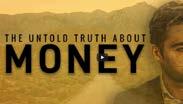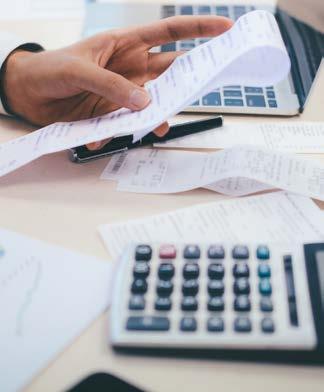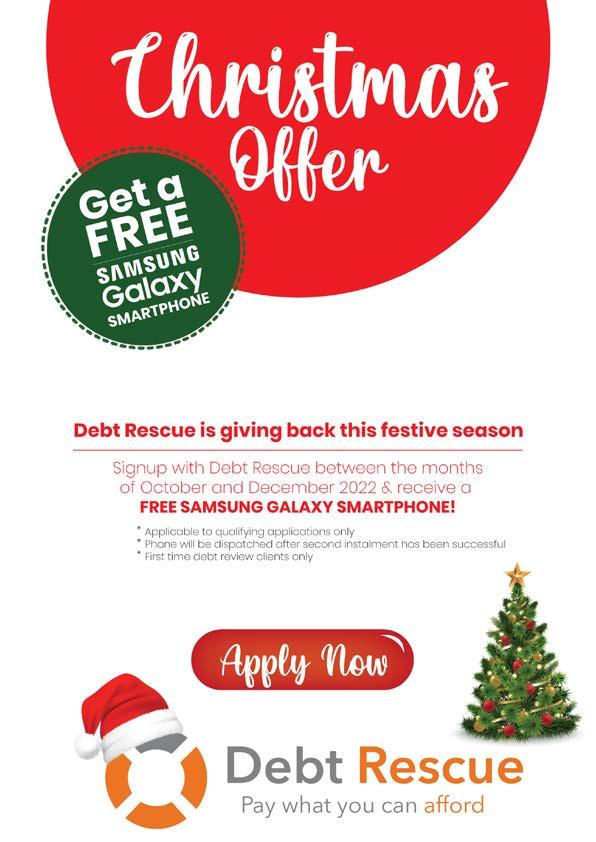
Get great Content right in your inbox. Subscribe now to our Newsletter. Reach financial freedom!


Get great Content right in your inbox. Subscribe now to our Newsletter. Reach financial freedom!
“I cannot explain how being debt-free feels. There is no feeling as free and empowering.”
Be a winner. Answer our question and you could win R250 Cash.
Save on everything from electricity to groceries and even online shopping.


Why you need to look after your money and never fall into the trap.
All the options available to you. How to sidestep the pitfalls and be protected.
Are you charged these fees? Check immediately what is on your statement.
“The more you know, the more you save. The more you save, the more you are able to do. Money is a tool to reach your dreams.”

There is no loss if you take action. Now. Take that action now.
How are you feeling this October? Have you taken time for yourself and your journey towards financial freedom?
Every financial journey is different. Some journeys require assistance, in fact, every journey needs financial assistance at some point.
We sometimes forget the truth that every problem has a solution. In this current economic rollercoaster with intermittent electricity and soaring food prices it may seem difficult to see the silver lining. Let us assure you there is always a path to financial freedom. It only takes action on your part.
The question this month is: What do you understand about the debt review process in South Africa?

Prize money for the winning letter is R250 Cash.

Below are three great financially empowering documentaries for you to watch and get inspired. Every human deserves a financially abundant life. Believe it, and start making those great money moves towards it.
Pay what you can afford

TIPS TO HELP YOU BECOME FINANCIALLY FREE!
is no longer an option. Saving is now about survival.”
Economies around the world are battling to keep inflation at bay. Soaring interest rates may curb the curve but are also taking food off the table in many homes. Saving money is now about survival. Difficult decisions are having to be made and consumer wallets are begging for a moments relief in any way, shape or form. While some families are fortunate enough to have more than one bread winner under the same roof, many more don’t. Saving money in our everyday lives needs to be an active approach. Our eyes need to be open wide to sales, opportunities and avenues where we spend less to save more.
This list is not exhaustive and there are thousands of opportunities available to save money. If you have some great tips up your sleeve, please send them in via whatsapp or email.

Negotiate Prices. Shop Local. Build the Economy.
Forget the trends. Go for comfort. Keep on saving.
Nature is healing. Switch off the tech. Nature is cheaper than cinema.
Your wallet loves pre-loved items! Save more.
If you don’t need it, someone out there wants it! Make extra bucks!
Student cards get discounts across the country.

Try no take-away for one month. Check the savings.
Just do it.
Bulk saves when you buy needed items.
Loyalty cards save mega bucks!
Use a koki. Draw on it. Use it.
If it’s not on the list it’s not in the basket.
Teach them about money. Set those boundaries.
Never let emotions pay the bill.
If you aren’t using it, save it.
See if you still like it after 30-days. Then buy it.
Leave it in the cart. Wait. Discount emails should come flying in.


Have 2 accounts. 1 for shopping. 1 for leaving at home.
Ask for lower prices and you may be suprised.
Cheap means you pay more than once.
Visit them. Support them and save!
Subscriptions are a massive money muncher. Check your bill.
Do your homework. There is always something with less fees.
Keep one. Just try it and be amazed.
We know debt-free means happy. We help you when you need it.

The geyser chows your electricity bill. Cover it and save.
When kids stay at home only the list gets bought.
Walk. Carpool. Stay at home. Save, save, save.
Instant gratification means tears until month end.
Look and you will find. There is so much in SA to explore without spending.



Payday loans are marketed as a quick easy solution to temporary financial difficulties. They are also available to people whose credit records are bad or in some cases, blacklisted. They boast simple application processes with minimal paperwork and often ‘same-day approval’. A payday loan can be a lifesaver, but it can also turn into a nightmare. And a cycle of debt that is difficult to break loose from.
Pay what you can afford
Payday loans carry high interest rates for the convenience of instant financial assistance. These short-term loans are unfortunately also open to peo ple with negative credit scores, which pulls them into a cycle that starts with borrowing money to make it to the next payday. In the end, an entire salary can easily end up in the pockets of creditors, forcing them to re peatedly take out short-term loans to make ends meet, until they no longer can.
Payday loans are attractive because the likelihood of approval is much higher than other forms of debt packages available. Consumers who have a negative credit score may find themselves in a po sition where a payday loan seems like the only option for survival. But let us look at the facts:
A payday loan often ranges from R500 –R8000.
Fees on payday loans are:
Service Fees
Initiation Fees
15% VAT
Interest rate depending on the lender (5%27.1%).
If you do not pay back the money within the allocated time frame, your credit score will be impacted negatively.
Sometimes there is no alternative in sight. Before you sign the agreement of a payday loan, ask yourself the following questions. Do I really need to take on this
type of debt and can I survive without it?
How will I repay this debt?
Can I repay this debt within the prescribed time frame?
How will I survive financially for the rest of the month after repaying this debt?
Am I borrowing this money because there is no other alternative?
Is the debt agreement suitable, have I read the fine print?
Can I risk damage to my credit record if I fail to pay?
Have I considered going under debt review and freeing up finances in my budget?
If you still plan on going ahead with the payday loan, is it because you have found yourself in a debt cycle already?
Is a payday loan the only money keeping you afloat above the other responsibilities?
If so, debt review can be a lifesaver with no risk of negative impact on your future finances.
Debt review is a legal process that protects the consumer. The process places you under protection from any further action by creditors. Regardless of the position that you find yourself in, a payday loan will only solve an immediate financial problem.
Debt review can provide immediate relief, as well as long term relief.

The process of debt review prevents your credit score from being blacklisted. A payday loan runs the risk of blacklisting you if you are late on your payment or if you default on it. In both debt review and payday loans you need to be employed to be able to afford the payments. Debt Rescue has structured their process in such a way that your financial commitments fall within your affordable budget.
Instead of throwing yourself into a never-ending cycle of debt through payday loans, rather remedy the situation and reach the stage of financial freedom through a simple online process with Debt Rescue.
“Debt Review is a legal process designed to assist over-indebted and struggling consumers.”

Owning a vehicle in South Africa is a necessity. The fluctuating petrol price and current rising cost of living makes this a financially difficult decision. Statistically, “Between January and March 2021, 4.1% of vehicle loans were defaulted on.” (Top Auto, 2021) Vehicles are repossessed every day, and yet every day new vehicle loans are made.
Where is the disconnect and how can you safeguard this vehicle purchasing process with the least amount of financial danger?
“You cannot control the past, but you can control where you go next”
In this article we will cover the various options that you have for purchasing a vehi cle to what rights the law has if you default on your payments. If you understand every corner of the process, you are better equipped to handle the actual costs of purchasing a new vehicle, and to ensure you never have to worry about your car being repossessed.
In the fourth quarter of 2020, the average loan amount for vehicle finance in South Africa was R320 183,00 (BusinessTech, 2021). But this once off cost will not be the only cost you pay. Running a car is not cheap. And to top it all off, once you drive that shiny new expensive car out of the dealership, it immediately loses between 9–11% of its value. And up to 20% of its value in the first year, and so it continues. Ouch.
A vehicle is a depreciating asset which means that from the moment you purchase your vehicle, its value begins to drop.
Therefore, your decisions need to be as realistic to your affordability as possible. You have various options to purchasing a vehicle in South Africa:
Cash purchase Vehicle Finance
Personal Loan
Rent-to-Own
The cash purchase option is preferred. The vehicle is yours and you do not owe any money to the bank. There is no interest to pay each month and the only further costs you will incur are the ‘extra costs’ of owning a vehicle which we discuss below.
Vehicle finance can be obtained through many credit providers, including banks across the country. Vehicle finance carries a lower interest rate as it is considered a secured debt, meaning they can take the vehicle away if you don’t pay. A balloon payment can be opted for on vehicle finance to bring your monthly repayments down. However, a balloon payment is not always the best option. These balloon amounts are hefty amounts which need to be paid in full when the repayment term comes to an end. Another option would be to carry the balloon payment over to a new car payment, thereby remaining in debt.
Watch ‘Everything You Need to Know
About Balloon Payments’ on our Money Moves with Debt Rescue Channel to find out more.
Some consumers choose a personal loan instead of vehicle finance to purchase their vehicles. Unfortunately, a personal loan is seen as unsecured debt. Unsecured debt carries far higher interest rates than vehicle finance, making your total repayment amount greater. It is never a good idea to purchase a car with a loan if possible. You will pay around 20% more in interest.
Rent-to-Own options are popular but excessively expensive. There are two varieties of rent-to-own in South Africa: 6-month commitment and month-to-month commitment. Rent-to-Own is not vehicle finance and depending on your personal agreement your payments could far exceed the value of the car. You are paying for convenience.
Many consumers see the price tag on a monthly repayment option and in their budget, that amount may be doable. However, regardless of the option you choose to purchase your vehicle there are certain ‘extra costs’ which should be considered. These costs are:
Vehicle insurance
The fluctuating petrol price
Car service fees which can cost anything from R10,000 upwards
Wear and tear on the car
Licence renewal fees
Fines (hopefully not!)
If you want to purchase a vehicle on finance, you will need to have the following in order: Your credit score needs to show affordability of the vehicle – download your free credit report here.
Your ID document
A valid driver’s licence
Proof of Residence
Proof of Income
In 2021 2.3 million consumers in South Africa had vehicle finance and approximately R4.3 billion rand was in arrears (BusinessTech, 2021). Affordability changes. Life happens and as we have seen over the past few months, inflation and interest rates can radically increase. This fluctuation in the economy puts many consumers in a position where they default on their repayments.
Car repossession does not happen overnight. There are a series of steps which credit providers usually take. Please remember that each credit provider has their own time frames before repossession which should be outlined in the fine print of your vehicle finance agreement.
Approximately 20 days after a defaulted car payment, your credit provider will send you a letter giving you a timeframe in which your payment must be made. If this payment deadline is missed, you will then be issued with a summons.
A summons means that a court will decide whether repossession is necessary and when they do, your credit provider will come to collect your vehicle. This is not the end though. Repossessed vehicles are auctioned for the credit provider to make up the outstanding balance on your account. But depending on the final sell price, you may still be liable for the outstanding balance. Repossession does not mean that you do not have repayments anymore. It means you will lose your vehicle and you will still have to repay the amount owed to the credit provider.
Buying a car in South Africa is risky. There are many costs to consider. There are also many avenues to slip up and lose your car. Debt Rescue can help you keep your asset depending on the nature of your circumstances. WhatsApp Debt Rescue now to see how we can help you keep your head above deep water.
Pay what you can afford

FEES ON YOUR CREDIT CARD YOU DIDN’T KNOW ABOUT
A credit card can be a lifeline. It allows us to purchase goods on credit to pay this money back at a later date – usually during the grace period. A credit card is basically a revolving loan on hand when needed. But what are the pitfalls in having the convenience of a credit card? And what are the 3 “hidden” fees most South Africans are not aware of?
If managed correctly, a credit card can keep your credit score in the green. Depending on the credit provider, credit cards come with an entire host of benefits. The most common ones are:
• Up to 55-days interest free periods on select transactions
• Adjustable credit limits
• Personalised interest rates
• Other benefits can include rewards for fuel or cash back at certain stores. But are the benefits worth the cost?
The cost of credit is notoriously expensive. Despite the benefits credit providers use to promote their financial products to hook us in.
These costs can be found in what is known as the schumer box. A schumer box is a summariszed breakdown of the interest rates and charges that you can incur on your credit card.
Costs such as, ‘interest charged for purchases’, will have an asterisk (*) next to the amount. This asterisk means that further information about your credit card fees can be found in the T’s & C’s.
Of course, not everyone reads through the terms before deciding to take on the monthly cost of a credit card, and this is often how consumers are caught in a financial whirlpool of ‘hidden fees’ added to their monthly repayment.
Did you read the fine print on your credit card agreement? Not many of us have. The truth is, fees are not allowed to be hidden at all. Lawfully everything must be
crystal clear in writing. The problem is that we don’t read the writing in our T’s & C’s, and we don’t take them into consideration. Essentially, leaving them hidden in our minds.
Fees on your credit card can be linked to exceeding limits, cash withdrawals and so on. It is in your best interest to read the fine print or ask your bank the right questions regarding the fees on your credit card. These fees can increase the amount that you have to pay towards your credit provider every month. And they also reduce the amount that you actually pay off the debt that you borrowed every month in your instalment.
Depending on the lender and your agreement, the fee may be charged annually or monthly. According to the National Credit Act this must be capped at R60 per month.
Your Credit card has a grace period attached to it. This is the time to pay off your outstanding balance. Within this period, most financial institutions will not charge interest. When this period is over though, your credit card will begin accruing interest at once.
Because the interest rate on your credit card is directly linked to the repo rate,which is currently sitting at 5.50%, your credit card balance can become financially overwhelming very quickly.
According to the National Credit Regulator (NCR) banks are not allowed to charge more than the repo rate, plus 14%. When this fluctuates, so do the fees on your credit card. Currently your interest would be 5.50% plus 14%.
As discussed above, interest is charged on your account when you do not pay your credit card within the grace period. But


We understand. That is why we are a phonecall away.